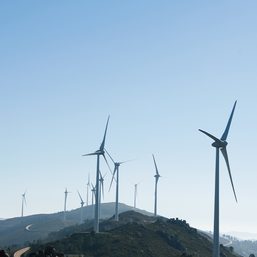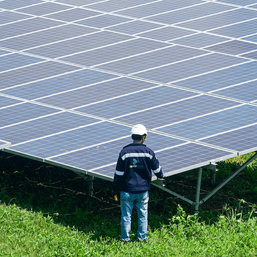SUMMARY
This is AI generated summarization, which may have errors. For context, always refer to the full article.

MANILA, Philippines – The Marcos administration has secured the legroom it needs to meet one of President Ferdinand Marcos Jr.’s campaign promises, after the Department of Justice (DOJ) issued a legal opinion that there are no foreign ownership restrictions on renewable energy projects.
In its legal opinion, the DOJ said that foreign investors can own 100% of renewable energy projects and are not subject to the cap set by the Constitution. Prior to this, it was assumed that foreigners can only own at most 40% in renewable energy joint ventures.
The Department of Energy (DOE) welcomed the legal opinion, noting that it would help the Philippines achieve its target share of renewable energy in the power generation mix of 35% by 2030 and 50% by 2040.
The legal opinion penned by Justice Secretary Crispin Remulla stated that the “exploration, development, and utilization of inexhaustible renewable energy” are not subject to the 40% cap on foreign equity provided in the Constitution.
The DOJ explained that foreign ownership restrictions exclude natural resources that are not “susceptible to appropriation,” such as the sun, wind, and ocean. It noted that the limit on foreign ownership was to preserve Filipinos’ limited and exhaustible resources.
Moreover, the DOJ said that the phrase “all forces of potential energy” in the Constitution should exclude energy of kinetic nature.
In physics, potential energy is “energy at rest,” while kinetic energy is “energy in motion.”
But for appropriation of water, the DOJ said that it will still be subject to the foreign ownership restriction set in the Water Code.
IRR revision
The DOJ noted that the implementing rules and regulations or IRR of Republic Act No. 9513 or the Renewable Energy Act of 2008 must be amended to conform to the newly released opinion.
Energy Secretary Raphael Lotilla said that the agency is now preparing the necessary amendments, particularly Section 19 of the Renewable Energy Law’s IRR, which specifies that Filipino corporations must hold at least 60% in any joint venture.
“Private sector investments are central in achieving our renewable energy targets and vision for the Filipino people and this is a welcome development for our foreign investors to invest in renewable energy production here in our country,” Lotilla said.
Currently, coal-fired power plants have around 44% of the total share, while natural gas and geothermal cornered 22.9% and 13.4%, respectively, DOE data showed. Hydro accounts for 10.5% while, wind, biomass, and solar are under 1%.
As of June 2022, a total of 998 renewable energy contracts with an aggregate installed capacity of 5,460.59 megawatts and potential capacity of 61,613.81 megawatts have been awarded by the DOE. This generated around P270.8-billion investments for the country.
The push for renewables is a campaign promise of President Ferdinand Marcos Jr., with images of windmills even repeatedly shown throughout his campaign. (READ: [OPINION] What must the green agenda be for a Marcos Jr. presidency?)
Marcos is also looking at pricey nuclear energy to resolve the country’s energy crisis. – Rappler.com
Add a comment
How does this make you feel?


![[ROUNDTABLE SERIES] Powering up: Building a bright future with energy security](https://www.rappler.com/tachyon/2024/04/Omnibus-with-guests.jpg?resize=257%2C257&crop_strategy=attention)
![[OPINION] Fossil fuel debts are illegitimate and must be canceled](https://www.rappler.com/tachyon/2024/04/IMHO-fossil-fuel-debt-cancelled-April-16-2024.jpg?resize=257%2C257&crop_strategy=attention)

There are no comments yet. Add your comment to start the conversation.